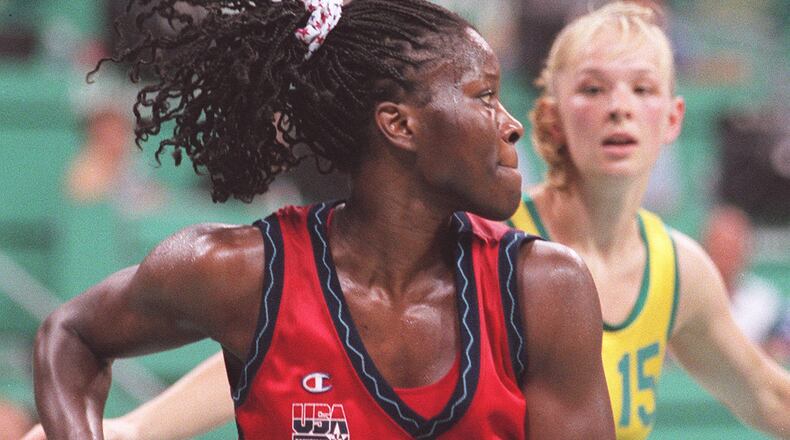The award for the nation’s top power forward is named after Katrina McClain, a legendary Georgia Lady Bulldog.
The 2020 award was given out Monday, but McClain’s defining moment came in the fall of 1984, at a time when Georgia coach Andy Landers knew how great she would be.
Landers wanted McClain to run the floor in transition and get easy buckets, but by the start of her sophomore season, she hadn’t done that yet.
Change came when Georgia was on the road playing Tennessee Tech.
“And we talked at length in the dressing room prior to that game about how she might get home from Cookeville, Tenn., if she didn't run the floor,” Landers recalled. “The various ways that she might find a way to get back to Athens.”
When she stepped on the floor, she made adjustments.
McClain won the tip and ran the floor for a pass and scored. Georgia went up 2-0.
Tennessee Tech crossed half court, Georgia stole a pass, and McClain sprinted for another easy bucket. Georgia led 4-0.
The Golden Eagles missed. McClain rebounded, Teresa Edwards got it back to McClain. Georgia led 6-0.
“In about 40 seconds we were ahead 8-nothing,” Landers said. “McClain had all eight of them just because she ran the floor.”
Thirty-six years later, the Katrina McClain Power Forward Award is in its third year. The positional award was created by Naismith Memorial Basketball Hall of Fame and the Women’s Basketball Coaches Association during the 2017-18 season for players in Division I college basketball.
The award is part of a starting five that includes awards names for point guard Nancy Lieberman, shooting guard Ann Meyers Drysdale, small forward Cheryl Miller and center Lisa Leslie.
“When Fran (Judkins of the Hall of Fame) first told me that, I was floored. I mean, I couldn't believe the feeling that I got when she told me that they would give this award out on my behalf,” McClain said.
She also said it made her feel thankful for the coaches and teammates she’s played with. “It’s such a joy to receive such an accolade,” she
McClain is a three-time Olympian, two-time All-American and 1987 National Player of the Year. She’s also all over the Georgia record books. She leads in points per game in a season (24.9), field goals made (310/32 games), field goal percentage in a season (.695) and career (.620) and rebounds in a game (24). She’s second in points in a game (43) and career games played.
She was a two-time USA Basketball Player of the Year, two-time gold medalist and in 2012 she was inducted into the Naismith Memorial Basketball Hall of Fame.
“There are coaches who think she may be the best power player to ever play,” said Landers, who coached McClain from 1983-87. “And I would tend to agree with that.”
Credit: JOEY IVANSCO
Credit: JOEY IVANSCO
Quiet, graceful Olympian
Katrina McClain can’t be defined by a singular trait. She could run the floor, score, block shots, and was great at pick and roll. Landers said it would be wrong to attach her to one skill, she was too good.
“Maybe the answer to that question is her ability to affect the game on a number of different levels,” he said. “You know, she really wasn’t one-dimensional. So I mean, her ability to affect the game in so many different ways was probably her strength on the court.”
Nikki McCray, current head coach at Old Dominion and McClain’s teammate on the 1996 Olympic gold medal team, said the only thing McClain wasn’t great at was shooting 3’s. “But she didn’t have to do that,” she said.
McCray and McClain were roommates during the tryouts for the 1996 Olympic team. McCray was one of the youngest players and just out of the University of Tennessee and McClain was a veteran, having played on two Olympic teams and many years abroad.
“I just learned so much from all of those women in ’96, but her in particular, how she came to work every single day, and did it the right way,” McCray said. “She just showed me so much about what it truly meant to be a professional.”
McCray admired McClain’s ability to adapt in various situations as well as play alongside other great players and still be acknowledged as one of the best power forwards to ever play.
Dawn Staley, current head coach of the U.S. national team and the University of South Carolina, who also played on the 1996 team, said many don’t understand how powerful McClain was, yet how easy she made playing look.
“If we were playing someone that was a spectacular guard, quick that we couldn’t always keep in front, she would whisper to us, ‘Let her go. Let her go,’” Staley recalled. “Like, let her drive to the basket and she would send that shot into the eighth row. I mean, that’s who Tree is.”
Landers said McClain was shy when she arrived in Athens, and others have said she has a quiet, unassuming personality. She’s consistently described as a selfless, graceful player with an underrated impact on the game.
McClain said that’s just how she was reared.
Credit: JOEY IVANSCO
Credit: JOEY IVANSCO
How her game was shaped
Katrina McClain was born Sept. 19, 1965 and grew up in Charleston, South Carolina.
Her father, who she said would often be called graceful, was a DJ at the local radio station, a pastor, a principal and even played football for the Baltimore Colts. Her mother was a registered nurse, took care of the elderly, liked to give back and worked at soup kitchens.
“So, for me to play the game and to play as humble, you know, humbly as I can,” McClain said. “That was just me. And that was just because I wouldn’t have it any other way.”
As a child, she grew up playing outside, whether it was football, baseball, softball, or basketball, with boys. She said not many other girls played sports at the time, and it was fine with her parents as long as she was inside before dark.
“I mean (the boys) didn’t hold back any punches you know, and the more physical they became the more physical I became. We would scrap,” she said. “So I think that kind of gave me that grit and that kind of stamina to actually, you know, to be good on the court.”
On the street is where she would plant the seeds of her success, developing her toughness, sharpening her competitiveness and strengthening her innate desire to win.
“She was a really, really gifted player. Very skilled,” Landers said. “That’s what set the table for her success, but her willingness to work, develop those skills, polish those skills and her competitiveness are the two things that I think separates her from a lot of great players.”
After she left the University of Georgia, she played in Japan, Italy, Spain and Turkey and won a gold and a bronze medal at the 1988 and 1992 Olympics, respectively.
A part of the requirements for earning a spot on the 1996 Olympic team was staying stateside and focusing on training and promoting the national team. It paid $50,000. To do so, she gave up the $300,000 she was to earn by playing in Hungary.
She laughed when being reminded of the decision, but said she doesn’t regret it. That team is now not only seen as legendary, but also their success led to the growth of the game and the creation of the WNBA, a league McClain never played in.
“It wasn't about the money and it should never be about the money in some regards, you know, and that's how strong my love for the game was,” she said. “The cause was important. It was more important.”
McClain loved winning gold in ’96, the camaraderie she shared with teammates and the opening ceremonies. But her favorite part of those games was playing at home, less than five hours from her hometown in Charleston and a little over an hour from her college town in Athens.
“It was like, wow, you know, being at home, as opposed to being over in Russia or being over in China, being in different countries playing,” she said. “I thought winning that gold was great, but being able to perform before our family and friends, that was probably the ultimate of ’96.”
This year, McClain announced the winner of the award from home, on a sofa with a framed photo recognizing her as a three-time Olympian hanging nearby. It only represents just a piece of her impact on the game of basketball.
“She is someone that has been an incredible part of the history of our game that’s forgotten,” Staley said. “You know we talk about a whole lot of different people, but to leave Katrina McClain out of the conversation is a travesty, to be honest. But I’m glad someone, the decision makers (named) the award after her for her position. It is much respected. And much deserved.”
About the Author
Keep Reading
The Latest
Featured




